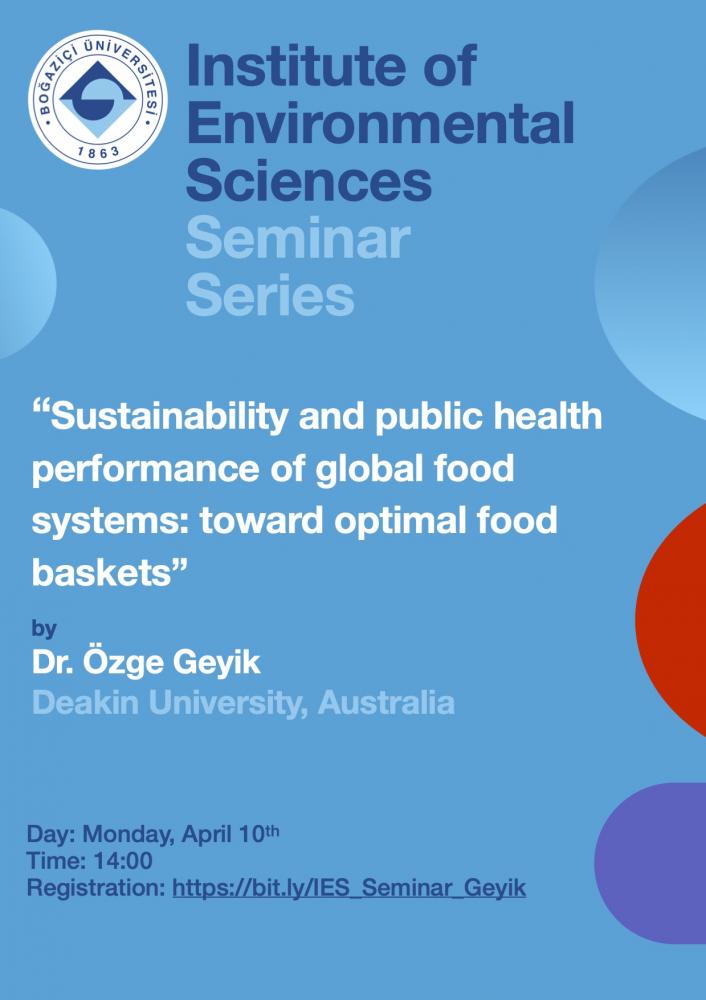IESc Seminar Series: Sustainability and public health performance of global food systems: toward optimal food baskets - By Dr. Özge Geyik

Institute of Environmental Sciences Seminar Series
“Sustainability and public health performance of global food systems: toward optimal food baskets”
By Dr. Özge Geyik
Deakin University, Australia
We cordially invite you to our online seminar “Sustainability and public health performance of global food systems: toward optimal food baskets” by Dr. Özge Geyik, Deakin University, Australia.
When: 10 April, Monday, 14:00-15:00
Where: We will be sharing the Zoom link with the registrants a few days before the seminar via email. Please do not forget to register using the below link.
Registration link: https://bit.ly/IES_Seminar_Geyik
Abstract:
At the heart of the sustainable development goals (SDGs) lie food systems, which have substantial impacts on nutrition and planetary boundaries worldwide. The COVID-19 pandemic has worsened the situation, with 702-828 million people suffering from hunger, up by ~150 million people post-pandemic, and over 2 billion people having micronutrient deficiencies. Food systems are also causing the Earth to exceed its limits, as they are accountable for a third of global greenhouse gas emissions, more than half of global habitable land use, and over 70% of freshwater consumption. Hence, the urgency to transform the food systems have been highlighted by the academic and intergovernmental circles alike. By linking highly disaggregated agricultural and seafood product data of global production and bilateral trade with those of food composition databases and dietary guidelines, I will walk through spatiotemporal trends in global food systems' ability to meet the SDG2 – Zero Hunger. Building on SDG-inspired scenarios, such as SDG12 – Responsible consumption and production and SDG13 – Climate Action, I will also explore options to nourish future populations while minimizing environmental impacts through the use of linear programming. Finally, I will conclude by discussing the next steps for a more comprehensive and dynamic assessment of nutrition-sensitive and sustainability-oriented food interventions to achieve multiple competing SDGs.
About Özge Geyik:
 Dr. Özge Geyik holds a BSc degree in industrial engineering from Boğaziçi University, Turkey (2014), and a joint MSc degree in industrial ecology from Chalmers University of Technology, Sweden, and the University of Graz, Austria (2016). Following a year of project coordination at TEMA Foundation, she completed her PhD in sustainability sciences at Deakin University, Australia (2021). Dr. Geyik continued her research in sustainable food systems as a Mercator – Istanbul Policy Centre fellow (2021) and as a postdoctoral fellow at the University of Göttingen, Germany (2021-22) and Deakin University, Australia (2022 – ). She has collaborations with researchers in agricultural economics, ecology, public health nutrition, and mental health. She has a keen interest in interdisciplinary research with expertise in life cycle thinking, sustainability assessment, food systems, sustainable nutrition, and environmentally extended multi-regional input-output analysis. Besides, she has consultancy experience in diverse projects on industrial ecology and sustainability.
Dr. Özge Geyik holds a BSc degree in industrial engineering from Boğaziçi University, Turkey (2014), and a joint MSc degree in industrial ecology from Chalmers University of Technology, Sweden, and the University of Graz, Austria (2016). Following a year of project coordination at TEMA Foundation, she completed her PhD in sustainability sciences at Deakin University, Australia (2021). Dr. Geyik continued her research in sustainable food systems as a Mercator – Istanbul Policy Centre fellow (2021) and as a postdoctoral fellow at the University of Göttingen, Germany (2021-22) and Deakin University, Australia (2022 – ). She has collaborations with researchers in agricultural economics, ecology, public health nutrition, and mental health. She has a keen interest in interdisciplinary research with expertise in life cycle thinking, sustainability assessment, food systems, sustainable nutrition, and environmentally extended multi-regional input-output analysis. Besides, she has consultancy experience in diverse projects on industrial ecology and sustainability.
